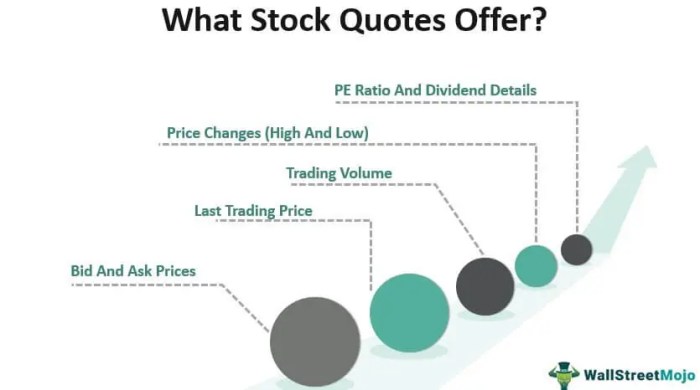What is stock price is a fundamental question that drives the financial world. Delve into the intricate details of this concept as we unravel the mysteries behind stock prices and their significance in the market.
Explore the dynamics of stock pricing and how various factors come into play to determine the value of stocks in the market.
What is stock price?

Stock price refers to the current market value of a share of a company’s stock. It is a crucial metric in the financial market as it reflects the perceived value of a company by investors and traders.
Ready to take the plunge into stock investing but feeling a bit lost? Our beginner’s guide to stock investing is here to help you every step of the way. From setting financial goals to building a diversified portfolio, this guide has you covered.
Stock prices are determined by the forces of supply and demand in the market. If there is high demand for a particular stock, its price tends to increase, while low demand can lead to a decrease in price. Factors such as company performance, economic conditions, investor sentiment, and market trends all play a role in shaping stock prices.
Factors that influence stock prices
- Company Performance: The financial health and growth potential of a company can impact its stock price. Positive earnings reports, new product launches, or strategic partnerships can lead to an increase in stock prices.
- Economic Conditions: Factors like interest rates, inflation, unemployment rates, and GDP growth can influence stock prices. A strong economy typically results in higher stock prices, while economic downturns can lead to declines.
- Investor Sentiment: Market perception and investor confidence play a significant role in stock price movements. Positive news or rumors can drive up stock prices, while negative sentiment can lead to declines.
- Market Trends: Overall market conditions, industry trends, and geopolitical events can impact stock prices. For example, a sector-wide sell-off or a bullish market can affect stock prices across various companies.
Types of stock prices: What Is Stock Price

Stock prices are crucial for investors to make informed decisions about buying or selling stocks. Understanding the different types of stock prices is essential to navigate the stock market effectively.
Market price
The market price of a stock is the current price at which a stock is being bought or sold on the open market. It is determined by the supply and demand dynamics in the market and constantly fluctuates throughout the trading day.
Bid price
The bid price is the highest price a buyer is willing to pay for a stock at a given moment. It represents the demand for the stock at that specific price point.
Curious about stock investment but not sure where to start? Learn all about what stock investment entails and how you can get started on your investment journey. Understanding the fundamentals is key to making informed decisions in the stock market.
Ask price
The ask price, on the other hand, is the lowest price at which a seller is willing to sell their stock. It reflects the supply of the stock available for sale at that particular price.
Are you new to the stock market and feeling overwhelmed? Don’t worry, we’ve got you covered with a comprehensive guide on stock market for beginners. This article will break down the basics and help you navigate the world of stock trading with ease.
Variation in stock prices across different stock exchanges
Stock prices can vary across different stock exchanges due to factors such as market conditions, trading volume, and investor sentiment. For example, the price of a stock listed on the New York Stock Exchange may differ from the price of the same stock listed on the London Stock Exchange.
Significance of stock prices for investors
Stock prices provide valuable information to investors about the performance of a company and its future prospects. Investors use stock prices to assess the value of their investments, make buying or selling decisions, and track the overall market trends.
Historical trends in stock prices
Understanding historical trends in stock prices is crucial for investors to make informed decisions. The impact of historical events on stock prices can provide valuable insights into market behavior and potential future movements.
Impact of Historical Events on Stock Prices
Historical events such as economic recessions, geopolitical tensions, natural disasters, and corporate scandals have all had significant impacts on stock prices. For example, the stock market crash of 1929, known as Black Tuesday, led to a prolonged period of economic hardship known as the Great Depression. This event caused stock prices to plummet, wiping out billions of dollars in wealth and leading to a major economic downturn.
Comparison of Stock Price Trends Over Different Time Periods
By comparing stock price trends over different time periods, investors can identify patterns and cycles in the market. For instance, analyzing stock prices over the past decade may reveal long-term growth trends in certain industries, while shorter time frames may show more volatile price fluctuations influenced by current events or market conditions.
Use of Historical Data to Predict Future Stock Prices, What is stock price
Investors and analysts often use historical data to predict future stock prices through various methods such as technical analysis, fundamental analysis, and quantitative modeling. For example, by examining past price movements, trading volumes, and market trends, analysts can develop predictive models to forecast potential price movements and make informed investment decisions.
Interpreting stock prices
:max_bytes(150000):strip_icc()/dotdash_Final_How_to_Understand_a_Stock_Quote_Oct_2020-01-2343a2cf9541435cbe38ed5e9484af20.jpg?w=700)
When it comes to interpreting stock prices, investors pay close attention to the movement of stock prices as it can provide valuable insights into the performance of a company and the overall market sentiment.
Concept of stock valuation and its relation to stock prices
Stock valuation is the process of determining the intrinsic value of a stock based on various factors such as financial performance, growth potential, and market conditions. The relationship between stock valuation and stock prices is crucial, as stock prices are influenced by how investors perceive the value of a company.
Role of stock analysts in interpreting stock prices
Stock analysts play a vital role in interpreting stock prices by conducting in-depth research and analysis to provide insights and recommendations to investors. They evaluate financial data, market trends, and company performance to help investors make informed decisions about buying, selling, or holding stocks.
In conclusion, understanding stock prices is key for investors looking to navigate the complex world of finance. Stay informed, stay ahead, and watch as stock prices reveal their secrets to those who are willing to learn.




